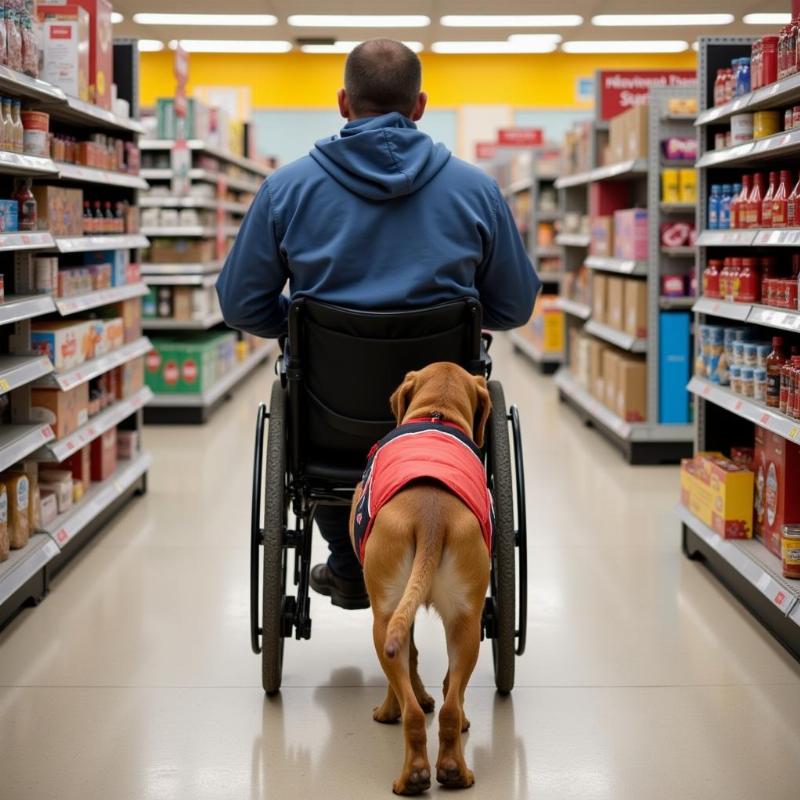Understanding service dog laws in South Carolina is crucial for both service dog handlers and business owners. These laws ensure that individuals with disabilities can access public spaces with their trained service animals, while also addressing the rights and responsibilities of businesses. This guide will delve into the specifics of South Carolina’s service dog laws, providing clarity and practical advice for navigating these regulations.
Understanding South Carolina’s Definition of a Service Dog
South Carolina, like many other states, adheres to the Americans with Disabilities Act (ADA) definition of a service animal. This means a dog that is individually trained to perform specific tasks or work for a person with a disability. Emotional support animals, comfort animals, or therapy animals are not considered service dogs under South Carolina law and are not afforded the same access rights. The tasks the dog performs must be directly related to the handler’s disability. Examples include guiding individuals who are blind, alerting individuals who are deaf or hard of hearing to sounds, pulling a wheelchair, interrupting self-harming behaviors, and retrieving dropped items.
 Service Dog Access in South Carolina
Service Dog Access in South Carolina
Public Access Rights for Service Dogs in South Carolina
Service dogs are generally allowed access to most public places in South Carolina, including restaurants, stores, hotels, and transportation. Businesses can only ask two questions: (1) is the dog a service animal required because of a disability? and (2) what work or task has the dog been trained to perform? They cannot ask about the nature of the disability or require documentation for the dog. However, if a service dog is out of control and the handler does not take effective action, or if the dog is not housebroken, the business can ask the handler to remove the dog.
Housing Rights for Service Dog Handlers in South Carolina
Under the Fair Housing Act, landlords must make reasonable accommodations for individuals with disabilities who use service dogs, even if the property has a “no pets” policy. This includes waiving pet fees or breed restrictions for service animals. Landlords can request documentation if the disability or the need for the service animal is not readily apparent. However, they cannot inquire about the specific nature of the disability.
Training and Certification Requirements for Service Dogs in South Carolina
While South Carolina law doesn’t mandate specific training or certification for service dogs, it’s highly recommended to ensure the dog is well-behaved and reliably performs its trained tasks. Proper training minimizes disruptions in public places and demonstrates the dog’s legitimate service animal status. Several reputable organizations offer service dog training programs, and seeking professional guidance is beneficial.
What to Do if Your Service Dog Rights are Violated
If you encounter discrimination or denial of access because of your service dog in South Carolina, it’s important to document the incident, including the date, time, location, and names of individuals involved. You can file a complaint with the South Carolina Human Affairs Commission or the U.S. Department of Justice.
Conclusion
Navigating service dog laws in South Carolina requires understanding both your rights as a handler and the responsibilities of businesses. By being informed and proactive, you can ensure that your service dog can accompany you in public spaces, providing the assistance you need while respecting the rights of others. Remember, a well-trained service dog is key to a smooth and positive experience for everyone.
FAQ
-
Do I need to register my service dog in South Carolina? No, there is no official registry for service dogs in South Carolina.
-
Can a business ask me what my disability is? No, businesses are not allowed to inquire about the specifics of your disability.
-
What if my service dog barks or misbehaves? While service dogs are expected to be well-behaved, occasional barking or minor disruptions are acceptable. However, if your dog is consistently disruptive or poses a threat, a business may ask you to remove it.
-
Can I bring my emotional support animal into businesses in South Carolina? No, emotional support animals do not have the same access rights as service dogs in South Carolina.
-
Where can I find more information about service dog laws in South Carolina? The South Carolina Human Affairs Commission and the U.S. Department of Justice are excellent resources for further information.
-
What if my landlord refuses to allow my service dog? You can file a complaint with the U.S. Department of Housing and Urban Development.
-
Are service dogs in training allowed the same access as fully trained service dogs? Service dogs in training are generally afforded the same access rights as fully trained service dogs in South Carolina.
Related Articles
- dog bite lawyer in myrtle beach
- are dogs allowed in restaurants in texas
- folly beach dog friendly restaurants
- dog friendly restaurants beaufort sc
About Beautdogs.us
Beautdogs.us is your premier online destination for all things dog-related in the USA. We provide expert advice on dog breeds, care, training, and products, offering a wealth of resources for both new and experienced dog owners. From breed spotlights to health tips, Beautdogs.us is your trusted source for comprehensive and engaging dog-related information. Contact us today for any inquiries: Email: [email protected], Phone: +1 501-555-7529.